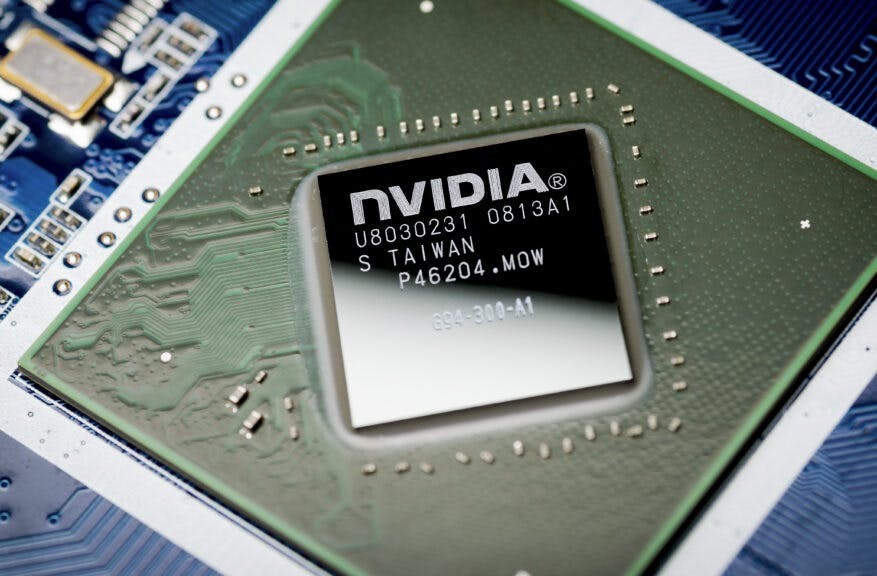 Klaudia Radecka/NurPhoto via Getty Images
Klaudia Radecka/NurPhoto via Getty Images
Tech titan Nvidia makes a major investment in the United States – as President Donald Trump tweaks the terms of his tariffs. The Trump administration continues to pursue a nuclear deal with Iran after holding the first direct talks with the country in years. And, it’s April 15 – tax day. How would the “big, beautiful bill” affect taxes going forward?
It’s Tuesday, and this is the news you need to know to start your day. If you’d rather listen to your news, today’s edition of the Morning Wire podcast can be heard below:
New Tariffs, New Factories

(Photo by Antonio Burdonovi via Getty Images)
Topline: President Trump announced new tariffs Monday, as tech giant Nvidia announced a historic investment in American chip manufacturing.
As we reported yesterday, the White House said it planned to offer tariff exemptions for certain tech imports like laptops and smartphones. But by Monday, the president announced that one crucial product — semiconductor chips — would not be exempt, and would instead be subject to their own tariffs. We’re still waiting to hear what sort of rate they’ll face, but it’s a big move — the United States imported nearly $850 billion worth of semiconductors last year.
In a major victory for the White House, tech giant Nvidia announced a half-trillion-dollar investment in American manufacturing. Over the next four years, the company will set up shop in Arizona and Texas – it has commissioned more than a million square feet of manufacturing space there. When production is complete, Nvidia says it will be able to construct supercomputers entirely in the United States. The company’s CEO said the investment would “strengthen our supply chain and boost our resiliency.”
“Nvidia controls almost that entire sector, which is one of the most important sectors in the world,” President Trump said at the White House on Monday in response to the announcement. “The reason they did it was because of the election on November 5th and because of a thing called tariffs.”
Trump also received good news from the Federal Reserve, which released its latest Survey of Consumer Expectations on Monday. It found that Americans believe inflation will rise in the coming months but expect it to be a short-term disruption. That’s important because consumer expectations of inflation can often become self-fulfilling as it changes what folks are willing to pay for certain products. Markets were seemingly pleased with Monday’s news, as the Dow, S&P, and Nasdaq saw gains across the board.
U.S. – Iran Nuclear Talks

(Photo by Kagenmi via Getty Images)
Topline: The Trump administration had its first direct contact with Iran last weekend, the first step in an attempt to hammer out a new nuclear deal. President Trump is pushing for a full dismantling of Iran’s nuclear program. A follow-up meeting is set for this Saturday.
The meeting was the start of the first direct talks between the United States and the Islamic Republic of Iran in years. Axios is reporting that there was a 45-minute face-to-face conversation in Oman between U.S. Special Envoy Steve Witkoff and Iranian Foreign Minister Abbas Araghchi.
“I think [a face-to-face meeting] helps to make sure that there is less room to cause confusion and also to drag out negotiations, which is what the Iranians are famous for doing,” Ellie Cohanim, Independent Women’s Forum Senior Fellow and former Deputy Envoy to Combat Antisemitism under President Trump, told Morning Wire. “The very fact that the Iranians came to the table is considered an embarrassment in the Iranian culture because this is the regime that from 1979, from its very inception of coming into power, is born of the original sin of taking our American Embassy staff hostage …’Supreme Leader’ Ali Khamenei apparently had to be convinced to even participate in talks with the United States. His advisors apparently let him know that they were advising him to participate in these talks because otherwise, it looked like there was a very high likelihood that Israel and the United States would strike Iran.”
Iran’s influence in the region has been steadily declining after a series of military and economic setbacks. Historically, Iran has used foreign proxy groups like Hamas, the Houthis, Hezbollah, and even the Assad regime of Syria to exert pressure on foreign enemies like Israel, Saudi Arabia, and the United States – arming and funding militants to create a thin veneer of separation between itself and open warfare. However, Hamas has taken tens of thousands of casualties in the ongoing war in Gaza, and Hezbollah’s command structure has been decimated by surgical Israeli strikes. Hezbollah fighters played a crucial role in propping up the Assad regime in the Syrian Civil War, and their collapse precipitated the ousting of the Assad government by Turkish-backed rebels – longtime Syrian dictator Bashar Al Assad fled to Moscow last December. Houthi militants have also taken heavy losses in the wake of an American counterassault to reopen shipping lanes in the Red Sea.
Meanwhile, Iran’s economy has suffered under Trump’s “maximum pressure campaign” of sanctions. The effort seems to have paid off. Cohanim told Morning Wire that the Iranian economy is “teetering … nearly on the verge of collapse. Their currency is just practically valueless right now.”
President Trump has made it clear that Iran must abandon its nuclear weapons program in order to reach a deal with the United States – recent intelligence suggests Iran has enough stockpiled fissile material to build two nuclear bombs, although progress on a delivery system for a hypothetical weapon is less certain. Iran and the United States previously negotiated a nuclear deal in 2015, but President Trump withdrew from it in 2018, arguing that the terms and enforcement mechanisms were too lax.
Tax Day!!!

(Photo by Richard Stephen via Getty Images)
Topline: Today is one of Americans’ least favorite days – tax day. And this year, the eternal debate raging around taxes goes all the way to the top.
Friendly reminder – today is your last chance to file your taxes on time.
This tax season, Congress is furiously negotiating a “big, beautiful bill” to set the country’s fiscal priorities – the draft legislation put forward by Congressional Republicans would, among other things, make the tax cuts from President Trump’s first term permanent. Pete Sepp, President of the National Taxpayers Union, told Morning Wire that “virtually every American family would benefit” if the budget bill were passed.
“Any family with children under the age of 17 is likely to benefit,” Sepp told Morning Wire. “Any wage earner is likely to benefit by the lower rates that would remain locked in place. Any worker for a corporation is likely to benefit because they would see their wages at a stable level or even increasing because the boss would have the money to be able to provide that.”
Anyone who might want to pass along something to their heirs could.
If the bill isn’t passed, Americans will face around a $4 trillion tax hike. Opponents claim that the bill would benefit the rich without helping the poor – that’s been the mantra from Democrats – and part of their rationale for voting against the budget reconciliation last week. Of course, there could also be a predictable political angle to this – Democrats may want to jam up the vote to make the other side look incompetent.
Source link

